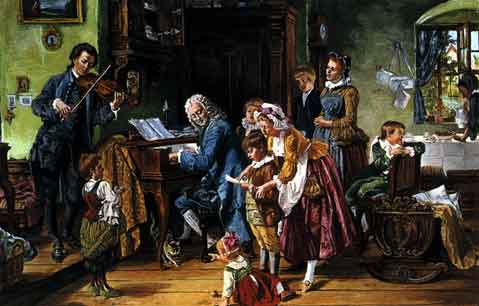
You shall love God, your Lord, with all your heart, with all your soul, with all your strength and with all your mind, and your neighbor as yourself.Bach's cantata BWV 77, "Du sollt Gott, deinen Herren, lieben," begins with one of his most remarkable choruses, which majestically sets forth the two greatest commandments of Scripture. In his performance notes on this chorus, John Eliot Gardiner says,
Here is one of those breathtaking, monumental opening choruses that defy rational explanation: how an overworked, jobbing church musician, locked into numbing routines, could have come up with anything so prodigious and not, as we have seen, in an isolated work, but as part of a weekly cycle of coherent works. Bach aims to demonstrate, by means of every musical device available to him, the centrality of the two "great" commandments of the New Testament and how "on these two commandments hang all the Law and the Prophets."Within the opening chorus, the voices state the New Testament commandment while the orchestra plays a chorale tune that his listeners would have recognized as a hymn of Martin Luther on the Ten Commandments, the Old Testament summary of God's laws. This is done in canon form, to show the inseparable relation between the two.
There are additional complexities that lend themselves to in-depth interpretation of what Bach was trying to communicate through this amazing chorus and the pieces which follow in BWV 77. Suffice it to say for our purposes that this cantata is a masterpiece of Biblical and theological communication, calling and moving us to love God and our neighbors.
Gardiner believes that Bach intentionally composed a cycle of works in Leipzig from Sundays 8-12 in Trinity, taking the Old Testament laws, reinterpreting them in terms of the Gospel passages for each Sunday, and then finding ways to apply their truths to his contemporary listeners. In fact, these cantatas may have been the work of a single librettist. In such craftsmanship, we see the power of Scripture combined with music, especially music as rich and profound as Bach's, to "teach and admonish" God's children.
The soprano aria summarizes the appropriate response to this teaching:
My God, I love You from my heart,
my entire life depends on You.
Let me only understand Your commandments
and be enflamed with such love,
that I will be able to love You forever.






